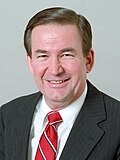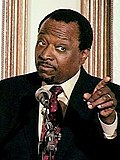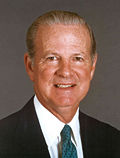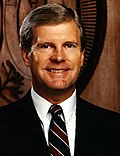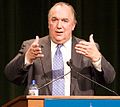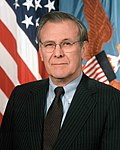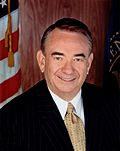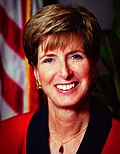Background
Following the 1994 midterm elections, many prominent candidates entered what would be a crowded field. This was expected as Democratic President Bill Clinton was unpopular in his first two years in office, eventually leading to the Republican Revolution. However, as Clinton became increasingly popular in his third year in office, several withdrew from the race or decided not to run.
Former president George H. W. Bush, who Clinton had defeated in 1992, opted not to seek the nomination, choosing instead to focus on his family life.
In February 1995, newly inaugurated Speaker of the House Newt Gingrich declined to run, despite urging from some members of the party's conservative wing. [1]
Former U.S. Army Gen. Colin L. Powell was widely courted as a potential Republican nominee. However, on November 8, 1995, Powell announced that he would not seek the nomination.
Former Secretary of Defense and future Vice President of the United States Dick Cheney was touted by many as a possible candidate for the presidency, but he declared his intentions not to run in early 1995. Then-Texas Governor and future President George W. Bush was also urged by some party leaders to seek the Republican Party nomination, but opted against doing so.
Primary race overview
Going into the 1996 primary contest, Senate Majority Leader Bob Dole was widely seen as the front runner. Dole had significant name recognition, as he was a two-time presidential candidate – in 1980 and 1988, and Republican vice-presidential nominee in 1976. He was expected to win the nomination against underdog candidates such as the more conservative U.S. Senator Phil Gramm of Texas and more centrist U.S. Senator Arlen Specter of Pennsylvania. The fragmented field of candidates, which also included journalist and 1992 presidential candidate Pat Buchanan and magazine publisher Steve Forbes, debated issues such as a flat tax and other tax cut proposals, and a return to supply-side economic policies popularized by Ronald Reagan. Former Governor of Tennessee Lamar Alexander had promising showings in the early Iowa and New Hampshire primaries—finishing third in both contests behind only Dole and Buchanan—but his support dropped off in later primaries and he ultimately failed to win any state's delegates. (see "1996 Republican primary and caucus results" table below). Alan Keyes, who served as Reagan's Ambassador to the United Nations Economic and Social Council and Assistant Secretary of State for International Organization Affairs, was notable for being the only African American candidate in the race, but he ultimately failed to garner much support. More attention was drawn to the race by the budget stalemate in 1995 between the Congress and the President, which caused temporary shutdowns and slowdowns in many areas of federal government service.
On January 29, Buchanan won a non-binding straw poll in Alaska. Most pundits dismissed Buchanan's showing as insignificant. [2] On February 6, Buchanan won the Louisiana caucus. Buchanan and Gramm had made several trips to the state to campaign. Gramm was expected to win, due to being from neighboring Texas and having the support of many of the Louisiana party regulars. [3]
The candidates met in Des Moines for a Presidential Candidates Forum. [4] Dole won the Iowa Caucus with 26% of the vote, a considerably smaller margin of victory than was expected.
Gramm's poor showing in Louisiana plus placing 5th in Iowa's caucuses resulted in his withdrawal from the contest on the Sunday before the New Hampshire primary.
In the New Hampshire Primary, Buchanan recorded a surprising victory over Dole, who finished in second place.
After disappointing showings in Iowa and New Hampshire, Steve Forbes bounced back in the primaries in Delaware and Arizona. Forbes, along with Alan Keyes, were the only two candidates for the Republican nomination who campaigned in Delaware (According to R.W. Apple writing for The New York Times , "People in Delaware began calling their primary the Rodney Dangerfield election – it couldn't get any respect. That angered many local residents, like a woman at a Wilmington polling place this evening, who said that the New Hampshire officials who twisted the candidates' arms [into not coming to Delaware to campaign while the New Hampshire primary was ongoing] had ‘acted like little kids.’" [5] ) giving Forbes an easy victory in the small state. "This state is the tax-cutting capital of the country and Steve Forbes got his tax-cutting message across" former Delaware Governor Pete du Pont said following the announcement of Forbes's victory. [6] The bigger triumph for the Forbes campaign was in Arizona. Buchanan campaigned vigorously in Arizona in hopes of securing a crucial victory over Dole, [7] with Buchanan even donning a cowboy costume while on the campaign trail. [8] Faulty polling by the Dole campaign lured Dole into a false sense of security, making Dole think that the state would be an easy victory for him and he would not have to spend much time campaigning in Arizona. [9] After the votes were counted, Buchanan finished a devastating third place, Dole was the runner-up, and Forbes pulled off a shocking, come-from-behind victory. Exit polls showed that Forbes's support came from those who voted for third-party candidate Ross Perot back in 1992, as well as from the large number of voters who cited "taxes" as the most important issue of the race and those who viewed Buchanan as too "extreme" and Dole as too moderate and "mainstream". [7] Forbes would quickly lose the momentum he built up in Delaware and Arizona, but these back-to-back victories convinced many that Forbes was a serious contender.
Buchanan's and Forbes's early victories put Dole's expected front runner status in doubt during the formative months of the primary season. Although he lost Arizona, Dole had wins in North Dakota and South Dakota on the same day before looking to win in Wyoming and South Carolina, the latter being the first of the Southern states with a primary that was also three days before the multi-state primary Super Tuesday. Dole prevailed over Buchanan by 15 points, where exit polls showed Dole siphoning those identifying as part of the Christian right (that Buchanan anticipated having a large majority over) to go with voters who regarded Buchanan as either too extreme or not extreme. [10] He proceeded to win the rest of the states, eventually giving him enough delegate commitments to claim status as the GOP presidential presumptive nominee.
Having collected only 21 percent of the total votes in Republican primaries and won four states, Buchanan suspended his campaign in March. He declared however that, if Dole were to choose a pro-choice running mate, he would run as the US Taxpayers Party (now Constitution Party) candidate. [11] Forbes also withdrew in March having won only two states. [12]
Dole resigned his Senate seat on June 11 to focus more intently on his presidential campaign. After becoming the nominee, Dole selected the former secretary of housing and urban development of the Bush administration, Jack Kemp, as his running mate.







